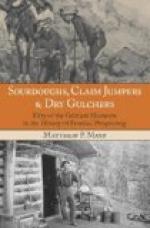“It isn’t much of a baking tin,” she commented, eyeing it critically, “but it’ll do.”
Under her direction Bennington impaled the two slices of ham on long green switches, and stuck these upright in the ground in such a position that the warmth from the flames could just reach them.
“They’ll never cook there,” he objected.
“Didn’t expect they would,” she retorted briefly. Then relenting, “They finish better if they’re warmed through first,” she explained.
By this time the potatoes were bubbling energetically and the coffee was sending out a fragrant steam. Mary stabbed experimentally at the vegetables with a sharpened sliver. Apparently satisfied, she drew back with a happy sigh. She shook her hair from her eyes and smiled across at Bennington.
“Ready! Go!” cried she.
The frying pan was covered with a tin plate on which were heaped live coals. More coals were poked from between the logs on to a flat place, were spread out thin, and were crowned by the frying pan and its glowing freight. Bennington held over the fire a switch of ham in each hand, taking care, according to directions, not to approach the actual blaze. Mary borrowed his hunting knife and disappeared into the thicket. In a moment she returned with a kettle-lifter, improvised very simply from a forked branch of a sapling. One of the forks was left long for the hand, the other was cut short. The result was like an Esquimaux fishhook. She then relieved Bennington of his task, while that young man lifted the kettle from the fire and carefully drained away the water.
“Dinner!” she called gaily.
Bennington looked up surprised. He had been so absorbed in the spells wrought by this dainty woods fairy that he had forgotten the flight of time. It was enough for him to watch the turn of her wrist, the swift certainty of her movements, to catch the glow lit in her face by the fire over which she bent. Then he suddenly remembered that her movements had all along tended toward dinner, and were not got up simply and merely that he might discover new charms in the small housekeeper.
He found himself seated on a rock with a tin plate in his lap, a tin cup at his side, and an eager little lady in front of him, anxious that he should taste all her dishes and deliver an opinion forthwith.
The coffee he pronounced nectar; the ham and mealy potatoes, delicious; the “johnny-cake” of a yellow golden crispness which the originator of johnny-cake might envy; and the bread and cake and butter and sugar only the less meritorious that they had not been prepared by her own hands and on the spot.
“And see!” she cried, clapping her hands, “the sun is still directly over us. It is not night yet, silly boy!”
CHAPTER XI
AND HE DID EAT




